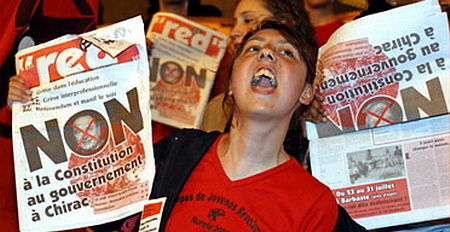Home > France delivers its judgment, and Europe is plunged into crisis
France delivers its judgment, and Europe is plunged into crisis
by Open-Publishing - Monday 30 May 2005
– Voters in overwhelming rejection of constitution
– UK poll in doubt after blow to ratification process
Jon Henley in Paris, Patrick Wintour and Nicholas Watt in Brussels
France’s voters last night decisively rejected the new European constitution, plunging the country into political upheaval and the EU into the deepest crisis in its 50-year history.
The outcome also prompted immediate speculation in London that Britain’s planned referendum on the treaty was now pointless.
With all of the votes counted last night, France’s interior ministry put the no vote at 54.87%. Overall turnout was forecast to be around 70%.
Article continues
Amid jubilant scenes on the Place de la Bastille, several leading members of the no camp called for the resignation of President Jacques Chirac, and an early dissolution of parliament.
Speaking just half an hour after the result, a sombre looking Mr Chirac said the voters had expressed themselves "democratically" and taken a "sovereign decision".
But he added: "This decision inevitably creates a difficult context for defending our interests in Europe."
He promised to "take full account of the fears and concerns" of voters by giving a "new impetus" to his government - widely interpreted as meaning the appointment of a new prime minister and a major cabinet reshuffle.
The foreign secretary, Jack Straw, said the result raised serious issues for the future direction of Europe given the scale of the French rejection.
He called for a "period of reflection" by all EU states, adding that Britain needed to wait for the Dutch vote on Wednesday and the EU heads of state meeting in two and a half weeks time, and pledged if the UK was to ratify the treaty, it would do so by referendum.
"The result raises profound questions for all of us about the future direction of Europe," Mr Straw said, adding: "Personally, I’m sad about the result. I think it was a very good treaty - one that would benefit not only Britain but also the rest of Europe. It was criticised by some in France as being too ’Anglo Saxon’. It was not too Anglo Saxon ... but the result is the result, and in democracies you have to respect the results of the electorate."
In Brussels, officials struggled to pick up the pieces as the EU entered the biggest crisis since its founding treaty was signed in Rome in 1957.
The agenda of the mid-June summit will be torn up to deal with the fallout of the French vote, and key budget discussions put on the backburner.
In a clearly orchestrated move, European leaders last night appealed for calm and said the ratification process would go on.
German chancellor Gerhard Schröder, said after speaking to Mr Chirac: "The referendum result is a blow for the constitutional process, but not the end of it."
In remarks that will have been coordinated with Downing St, Britain’s European commissioner, Peter Mandelson, said he was "confident" Britain would hold a referendum next year, providing there was a text to vote on.
In private, however, British officials say it is very difficult to see how the constitution can survive such a resounding rejection by a founding EU member.
European leaders are likely to point out the expanded Europe of 25 can function on the basis of the 2001 Nice Treaty. But once the dust has settled, they will be left looking at two questions: can the less controversial elements of the constitution be saved, and how seriously has the future direction of Europe - most notably its enlargement - been jeopardised.
There are fears the delicate compromise between "Old" and "New Europe" at the heart of the constitution - which allowed the likes of Britain to champion enlargement as the price for allowing France to deepen European integration - may fall apart.
Mr Blair, who is on holiday in Italy, is expected to make a statement today.
Mr Mandelson insisted the prime minister had wanted a yes vote, but admitted the campaign had exposed Anglo-French strains about competing visions of Europe.
He said some of the French "don’t understand the modern world". He added: "They don’t like the liberal trend of policies. They don’t like the policies of opening markets, and freer trade, of economic reform, reforming the common agricultural policy and reducing that expenditure, and of social and welfare reform.
"All this has become wrapped up and embodied in this constitutional treaty which they see as somewhat alien, somewhat Anglo-Saxon."
The scale of the defeat appeared to surprise the French government. The French foreign minister, Michel Barnier, said the result was "a very testing moment, and a very big disappointment". He said it would now be "a great deal more difficult for France to represent its interests".
But leading French no campaigners, such as the right-wing nationalist Philippe de Villiers, pronounced the treaty dead, declaring: "There is no more constitution. The people have massively said no ... It is necessary to reconstruct Europe on other foundations that don’t currently exist."
Pro-Europeans in Britain, which takes over the EU’s rotating presidency in July, have openly admitted there would be no sense in holding the referendum planned for next year, and warned of explosive clashes with a wounded Mr Chirac on Europe’s direction.
The Foreign Office, which has been working for days on the basis of a no vote in France, believes it can win backing for EU member states to scrap the whole ratification process. It said it would take many days to assess the implications.
The 448-article constitution is intended to make the bloc more democratic, more efficient and better able to face global competition. It has to be ratified by all 25 members and rejection by a pivotal founding state has widely been seen as sounding its death knell.




